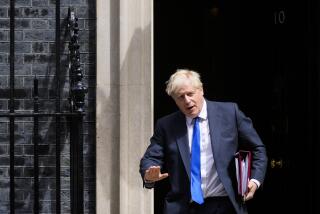Blair Takes On Labor Rebellion
- Share via
LONDON — British Prime Minister Tony Blair faced down a looming rebellion from within his Labor Party on Monday, refusing demands from colleagues to name the date he would leave his job.
“To state a timetable now would simply paralyze the proper working of government,” Blair told a news conference. “It wouldn’t end this distraction but would take it to a new level.”
The Times of London published a poll today showing Labor at its lowest level of popularity since 1992, five years before Blair came to power.
After weeks of turmoil -- starting with scandals involving his government ministers, followed by a decisive defeat in local elections last week and culminating in a controversial Cabinet reshuffle -- Labor lawmakers have been growing restive and vocal.
A draft letter circulating among Labor members of Parliament demanded that Blair set a timetable for a “stable and orderly transition” of power to a new Labor leader and was reported in the British media to have been signed by 50 lawmakers.
Chancellor of the Exchequer Gordon Brown, Blair’s longtime rival and heir apparent, used the phrase “stable and orderly transition” no less than 10 times during a Sunday TV interview. Brown is widely seen within Labor as the party’s best chance of winning a fourth term after Blair.
Before a meeting between Blair and Labor members of Parliament on Monday night, the BBC reported that only four of the legislators thought the prime minister should wait to step down until his term in office ends, which could be as late as 2010, and 29 supported his right to go “when he likes.” Twenty-six wanted him to go at once, and 26 others wanted him out within a year.
Blair replied to the rebellious lawmakers elliptically.
“There are those who genuinely want me to honor the commitment to a stable and orderly transition,” Blair said. “And I repeat, I will honor it, with the time plainly needed for my successor to establish himself.”
The prime minister announced before winning his third term last year that he would step down before the next general election. But until now he has said that he intended to serve a full term of office.
On Monday, he dropped that defiant language. Instead, he said he wanted his legacy to be a fourth-term Labor government after he stepped down.
Blair added that, unlike former Prime Minister Margaret Thatcher -- who lost power after a coup within her Conservative Party during her third term in office -- he had “no intention of going on and on and on.”
Some Labor members of Parliament said after Monday’s meeting with Blair that they felt reassured. John Grogan said Blair had moved “quite a lot.” Geraldine Smith said Blair was “moving in the right direction” but should step down by the end of summer 2007.
But others seemed bitter about suggestions by Blair that the Labor lawmakers turning against him were obstructing his agenda. Blair told the news conference that some of those calling for him to go wanted to “radically change the direction of policy and not to renew Labor but to reverse it.”
His new home secretary, John Reid -- sometimes called a Rottweiler in the British media -- spoke up in the prime minister’s favor over the weekend, saying that pressure to name an exit date was “actually
So did the former transportation secretary, Stephen Byers, who told Sky News: “For those people who are organizing a coup against him, they are playing a very dangerous game and they should stop.”
At his own news conference this morning, the Conservative leader, David Cameron, whose party made major gains at Labor’s expense in Thursday’s local elections, said of Blair: “The sooner he goes, the better.”
More to Read
Sign up for Essential California
The most important California stories and recommendations in your inbox every morning.
You may occasionally receive promotional content from the Los Angeles Times.













